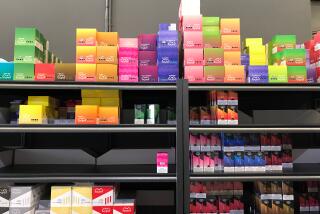Court Refuses to Derail Cigarette Suit : Smoking: California case accuses R.J. Reynolds Tobacco Co. of using Joe Camel to entice children to light up.
WASHINGTON — The Supreme Court refused to derail a California lawsuit accusing a cigarette maker of using Joe Camel, a suave cartoon character, to entice children to smoke.
The court, acting without comment Monday, turned away arguments by R.J. Reynolds Tobacco Co. that federal law preempts any such proceeding in a California state court.
“We are not surprised; neither are we disappointed,” said company spokeswoman Peggy Carter after learning of the court’s action. “We are prepared to go forward to defend ourselves. . . . There is no basis for this complaint.”
Reynolds, which manufactures Camel cigarettes, was sued in 1991 by San Francisco lawyer Janet Mangini. She says she acted after hearing a report that Joe Camel was as familiar to children as Mickey Mouse.
The suit named R.J. Reynolds Tobacco Co., which makes Camels, as well as a unit of The Interpublic Group of Companies and Young & Rubicam Inc., the advertising agencies which helped develop the campaign.
The lawsuit charged the defendants engaged in unlawful and unfair business practices because the advertising targets minors for the purpose of inducing and increasing their illegal purchases of cigarettes. It also alleged the defendants were unjustly enriched by the advertising campaign.
According to the lawsuit, teen-age smokers accounted for $476 million of Camel sales in 1992, compared to just $6 million in 1988 when the advertising campaign started.
The lawsuit seeks to stop the Joe Camel advertising campaign and to require the defendants to undertake a “corrective” advertising campaign warning of smoking’s health hazards.
“As an individual citizen, I thought something should be done about that, that Reynolds was pandering to children,” Mangini told The Associated Press.
Her lawsuit alleges that Reynolds, a subsidiary of RJR Nabisco Inc., had violated a California law barring unfair business practices.
A state trial judge threw out the lawsuit, ruling that state regulation of smoking was blocked by a federal law, the Federal Cigarette Labeling and Advertising Act.
A section of that law says: “No requirement or prohibition based on smoking and health shall be imposed under state law with respect to the advertising or promotion of any cigarettes (in packages carrying the federally required warnings).”
A state appeals court reinstated Mangini’s lawsuit, and its ruling was upheld by the California Supreme Court last June.
The state court did not rule that the Joe Camel campaign is aimed at minors, an allegation Reynolds denies. The issue was left for resolution at a trial.
The state court rejected Reynolds’ argument that a ban on selling cigarettes to minors is based on health concerns, and therefore states may not regulate ads that allegedly target minors.
More to Read
Inside the business of entertainment
The Wide Shot brings you news, analysis and insights on everything from streaming wars to production — and what it all means for the future.
You may occasionally receive promotional content from the Los Angeles Times.










